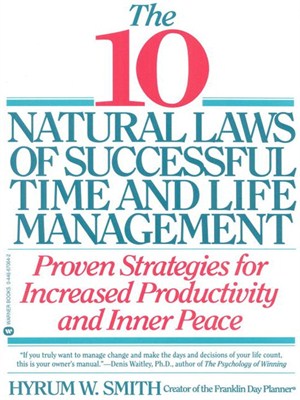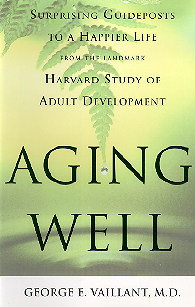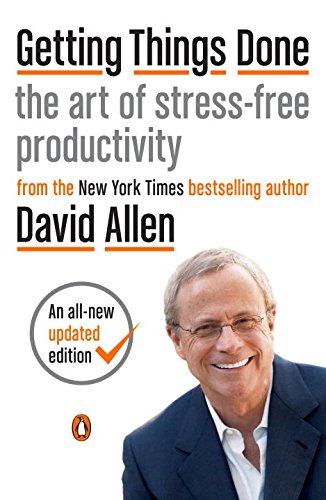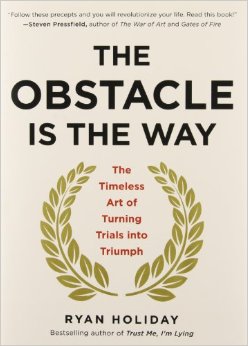if you think people bristle at lists, just ask them about self-help books. i will confess to not understanding the stigma and baggage wrapped around them. especially when therapy in comparison, in some circles, seems like a status symbol. but from the first time i ran across one, i instanly became intrigued by their composition and objective. for me they served a mentorship role i was in dire need of. that said, most self-help literature is admittedly like eating chicken wings—lots of work for minescule chunks of meat. but, oh my, can that meat be a tasty and memorable morsel. and that is what keeps us reaching for that next one in the basket.
one lesson i've learned in life is the importance of timing. my first and most powerful dose of this came when i first met my wife. i knew in a single breath that she was the one for me but after five painful and awkward dates, anyone could see it was just not clicking so we threw in the towel. i called her a year later for a follow-up date, mostly because i couldn't stop thinking about her. this do-over date began as each of the prior ones did, painful and awkward but then, forty minutes in, for reasons i've never understood, the world fell away and at that precise moment the rest was irreversibly set in stone.
self-help books possess this timing quality. there are many times i've started a book and it just didn't speak to me. i pull it off the shelf years later and it owns every ounce of my attention. while this applies to all sorts of books, it is doubly applicable to self-help books. further, i have recommended some of these books to people and to my knowledge, aside from the third one listed, they have never helped anyone to the degree they have helped me so in that vein i do not recommend reading them on a whim or simply based on them being listed here. it would be akin to taking Nyquil medicine when you are not sick. Nyquil is a violently foul thing to swallow when you need it and know it will help you. it is an unfathomable thought when you are doing ok and don't need it. so please peruse this list with that understanding in mind.
SELF-HELP BOOKS THAT HAVE HAD THE LARGEST IMPACT ON MY LIFE
(in order of their import/impact)

The 10 Natural Laws of Successful Time and Life Management (Hyrum Smith)
this book started it all for me.
it was recommended by a friend i approached who seemed to be the most engaged and energized human i ever met.
i've recommended it to dozens of people over the years.
it has impacted exactly ZERO of them the way it did me.
as for how it touched me, i vividly remember reading it on the subway going into work and without realizing it, i had had tears running down my face.
this book is namely why i make the red-text note above that your intersection with anything, be it people, a film, a sentence you hear, a job you get has more to do with the timing of it in your life than the actual payload it carries.
i found this book when i needed to and it began a life reclamation project that continues today.

Let me share an experience that suggests the potential power that the natural laws discussed in these pages can have in your life. An executive with the Merrill Lynch Corporation attended our seminar several years ago at their corporate training facility in Princeton, New Jersey, as part of the advanced training Merrill Lynch provides its brokers after their first year with the firm. A year after this gentleman had gone through the seminar he wrote me a four-page handwritten letter that, even as I think about it today, makes me emotional. In his letter he said something to this effect: "Hyrum, I went to your seminar a year ago in Princeton. It never occurred to me that what I do on a daily basis ought to be based on my governing values. I found that to be a very exciting idea. I came away from that seminar and identified my governing values, the things that really matter most to me. In the process of that introspection, I discovered that one of my governing values was a good life for my son. When I admitted that to myself, I also had to admit that I wasn't doing anything for my son. This past year, I decided I would dedicate my life to making a good life for my son.
He then described several fun things that he had done with and for his son. On the third page of this handwritten letter he said, "Hyrum, last week my son, eight years old, was killed in an automobile accident. I have experienced some real pain at the loss of my son. But I have to tell you that I have experienced no guilt. For the first time since your seminar, I realized what you were talking about when you discussed the idea and concept of inner peace." He then closed the letter by saying, "Hyrum, thank you."
|

Aging Well (George Valliant)
the primary lesson i took from this book deals with the devastating and irrecoverable toll poor and immature decisions can take on a life. its impact on me was near immediate. days after digesting the core message i received a combative email from a difficult colleague. moments after reading it i pushed back from my desk to begin a heated march to his office. the notions from this book played across my mind's ticker-tape machine. i stopped myself and decided to wait out this initial reaction and consider what a "mature" response to this push in the shoulder might be. by the next morning my cooler mind had found an elegant and reasoned course that spared me (and my foe) from an unprofessional and time-consuming (and pointless) dust-up. the ease of this alternate path made an immediate convert of me and i work hard to view all of my more important and consequential decisions through this measured prism.

What follows is not an excerpt from the book but from an Atlantic article about the book (and ultimatley what led me to the book)
The story gets to the heart of Vaillant's angle on the Grant Study. His central question is not how much or how little trouble these men met, but rather precisely how—and to what effect—they responded to that trouble. His main interpretive lens has been the psychoanalytic metaphor of "adaptations," or unconscious responses to pain, conflict, or uncertainty. Formalized by Anna Freud on the basis of her father's work, adaptations (also called "defense mechanisms") are unconscious thoughts and behaviors that you could say either shape or distort—depending on whether you approve or disapprove—a person's reality.
Vaillant explains defenses as the mental equivalent of a basic biological process. When we cut ourselves, for example, our blood clots—a swift and involuntary response that maintains homeostasis. Similarly, when we encounter a challenge large or small—a mother's death or a broken shoelace—our defenses float us through the emotional swamp. And just as clotting can save us from bleeding to death—or plug a coronary artery and lead to a heart attack—defenses can spell our redemption or ruin. Vaillant's taxonomy ranks defenses from worst to best, in four categories.
At the bottom of the pile are the unhealthiest, or "psychotic," adaptations—like paranoia, hallucination, or megalomania—which, while they can serve to make reality tolerable for the person employing them, seem crazy to anyone else. One level up are the "immature" adaptations, which include acting out, passive aggression, hypochondria, projection, and fantasy. These aren't as isolating as psychotic adaptations, but they impede intimacy. "Neurotic" defenses are common in "normal" people. These include intellectualization (mutating the primal stuff of life into objects of formal thought); dissociation (intense, often brief, removal from one's feelings); and repression, which, Vaillant says, can involve "seemingly inexplicable naïveté, memory lapse, or failure to acknowledge input from a selected sense organ." The healthiest, or "mature," adaptations include altruism, humor, anticipation (looking ahead and planning for future discomfort), suppression (a conscious decision to postpone attention to an impulse or conflict, to be addressed in good time), and sublimation (finding outlets for feelings, like putting aggression into sport, or lust into courtship).
|

Getting Things Done (David Allen)
this is the one and only book i've ever read that i think could help all people (that live in a first-world society at least). every other book on this list deals in the perceptual and abstract. this is the only brass tacks book on the list. i've read others which have helped here and there, but this one offers the tools to do a complete makeover of your organizational life. allen's methods are shockingly mature and tested. it seems most of these books are penned on the quick trying to beat others to market. unlike those, allen's methods were in play for a good long while before the notion of documenting his approach gained traction. and it is his comprehensive and proven model that lets you hit the ground sprinting with confidence.

The purpose of this whole method of workflow management is not to let your brain become lax, but rather to enable it to move toward more elegant and productive activity. In order to earn that freedom, however, your brain must engage on some consistent basis with all your commitments and activities. You must be assured that you're doing what you need to be doing, and that it's OK to be not doing what you're not doing. Reviewing your system on a regular basis and keeping it current and functional are prerequisites for that kind of control.
If you have a list of calls you must make, for example, the minute that list is not totally current with all the calls you need to make, your brain will not trust the system, and it won't get relief from its lower-level mental tasks. It will have to take back the job of remembering, processing, and reminding, which , as you should know by now, it doesn't do very effectively.
|

Flow (Mihaly Csikszentmihalyi)
for someone into time and life management, this work is breathtaking.
you can tell how much a book spoke to me by examining it physcally and observing the number of dog-eared pages and how marred the margins are with my excited scrawls.
this book is devastated.
in short, the author, with an unfortunately unpronounable name, teaches you how to bend time like neo does in the matrix.
flow is something that has happened to all of us, but it is an elusive experience.
here the phenomenon that happens to our time and experience is documented and described in a way where you can not only better understand what is happening BUT have the potential of cornering it in the paddock and riding, even taming, it like the wild and ever-moving creature it is.

Although, as we have seen, people generally long to leave their places of work and get home, ready to put their hard-earned free time to good use, all too often they have no idea what to do there. Ironically, jobs are actually easier to enjoy than free time, because like flow activities they have built-in goals, feedback, rules, and challenges, all of which courage one to become involved in one's work, to concentrate and lose oneself in it. Free time, on the other hand, is unstructured, and requires much greater effort to be shaped into something that can be enjoyed. Hobbies that demand skill, habits that set goals and limits, personal interests, and especially inner discipline help to make leisure what it is supposed to be—a chance for re-creation. But on the whole people miss the opportunity to enjoy leisure even more thoroughly than they do with working time. Over sixty years ago, the great American sociologist Robert Park already noted: "It is in the improvident use of our leisure, I suspect, that the greatest wastes of American life occur."
The tremendous leisure industry that has arisen in the last few generations has been designed to help fill free time with enjoyable experiences. Nevertheless, instead of using our physical and mental resources to experience flow, most of us spend many hours each week watching celebrated athletes playing in enormous stadiums. Instead of making music, we listen to platinum records cut by millionaire musicians. Instead of making art, we go to admire paintings that brought in the highest bids at the latest auction. We do not run risks acting on our beliefs, but occupy hours each day watching actors who pretend to have adventures, engaged in mock-meaningful action.
This vicarious participation is able to mask, at least temporarily, the underlying emptiness of wasted time. But it is a very pale substitute for attention invested in real challenges. The flow experience that results from the use of skills leads to growth; passive entertainment leads nowhere. Collectively we are wasting each year the equivalent of millions of years of human consciousness. The energy that could be used to focus on complex goals, to provide for enjoyable growth, is squandered on patterns of stimulation that only mimic reality. Mass leisure, mass culture, and even high culture when only attended to passively and for extrinsic reasons—such as the wish to flaunt one's status—are parasites of the mind. They absorb psychic energy without providing substantive strength in return. They leave us more exhausted, more disheartened than we were before.
Unless a person takes charge of them, both work and free time are likely to be disappointing. Most jobs and many leisure activities—especially those involving the passive consumption of mass media—are not designed to make us happy and strong. Their purpose is to make money for someone else. If we allow them to, they can suck out the marrow of our lives, leaving only feeble husks. But like everything else, work and leisure can be appropriated for our needs. People who learn to enjoy their work, who do not waster their free time, end up feeling that their lives as a whole have become much more worthwhile. "The future," wrote C. K. Brightbill, "will belong not only to the educated man, but to the man who is educated to use his leisure wisely."
|

The Obstacle Is The Way (Ryan Holiday)
this book kicked open doors in my mind i didn't even know existed.
and thankfully so, because i can already see the thinking that got me through the first half of life is probably not going to serve me equally well in my second leg of life. this book, i believe, is sharing some tools i'll need for this next bit of road. it has also led me to a extensive bank of exciting authors and writing that will surely have me occupied for decades to come.

What is Perception? It's how we see and understand what occurs around us—and what we decide those events will mean. Our perceptions can be a source of strength or of great weakness. If we are emotional, subjective and short-sighted, we only add to our troubles. To prevent becoming overwhelmed by the world around us, we must, as the ancients practiced, learn how to limit our passions and their control over our lives. It takes skill and discipline to bat away the pests of bad perceptions, to separate reliable signals from deceptive ones, to filter out prejudice, expectation, and fear. But it's worth it, for what's left is truth. While others are excited or afraid, we will remain calm and imperturbable. We will see things simply and straightforwardly, as they truly are—neither good nor bad. This will be an incredible advantage for us in the fight against obstacles.
|
Have a book that changed your life? you know i'd love to hear what it is and what it did for you.
|